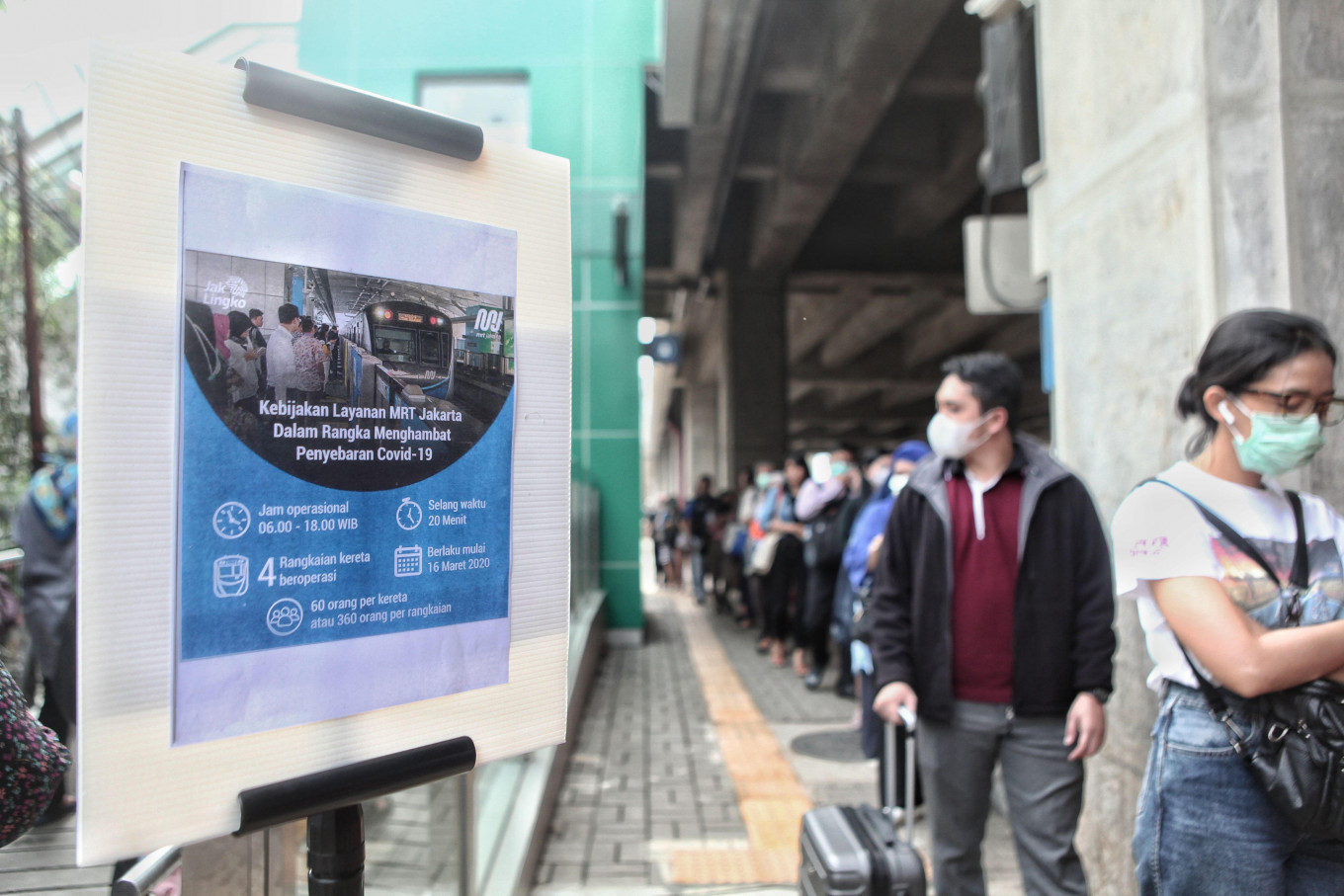Popular Reads
Top Results
Can't find what you're looking for?
View all search resultsPopular Reads
Top Results
Can't find what you're looking for?
View all search resultsPublic transportation returns to normal
Change text size
Gift Premium Articles
to Anyone
Jakarta Governor Anies Baswedan has removed a restriction on the operational hours of public transportation after just one day.
He said on Monday evening that public transportation would return to normal following a suggestion from President Joko "Jokowi" Widodo.
However, Anies said the Jakarta administration would uphold a recommendation for social distancing to prevent the spread of the novel coronavirus by limiting lines at Transjakarta and MRT Jakarta stations.
The restriction massively backfired, with large crowds and long lines building up at Transjakarta and MRT Jakarta stations across the capital on Monday.
The lines accumulated as commuters wearing face masks squeezed into packed bus stops and train stations during peak hours in the morning, with many commuters waiting for hours and becoming distressed over being late for work.
While some commuters appeared ignorant about the city’s containment efforts, many others had no option because they still had to go to work since their companies had yet to impose or had only imposed a partial workfrom-home policy.
Read also: Work-from-home policy in effect at major Jakarta companies over virus concerns
Aninda, a 27-year-old stateowned enterprise worker, said she was not able to stay at home because her company enforced a two-shift policy where each division was divided into two groups, taking turns working at the office and at home on a weekly basis.
“I’m currently living with my parents in Ciganjur [in South Jakarta] and I was planning to leave from the Ragunan bus stop. Arrived there at about 7 a.m. I saw people lined up for approximately 10 meters,” Aninda said on Monday.
City transportation companies said such operational restrictions were in line with the instructions of President Jokowi and an appeal from the World Health Organization to limit movement and maintain social distance in an effort to minimize the spread of the virus.
Anies previously announced the city would limit the operational frequency of public transportation for the next 14 days starting on Monday so that people with no urgent need to travel could remain at home.
In response to Monday’s chaos, Transjakarta appealed to Jakarta commuters to manage their travel times as well as possible by avoiding rush hours to prevent the possibility of overcrowding on the buses.
“We urge customers to make the best schedule to get home before 6 p.m. and make sure not to jam [ into the bus],” Transjakarta corporate secretary Nadia Diposanjoyo said in a statement.
Transjakarta management announced the restrictions on Sunday, saying it would only operate 13 routes, down from 248, with a 20-minute headway. The company will also suspend its evening services.
Meanwhile, to ease passenger mobility on Monday, Nadia said, Transjakarta deployed a total of 290 vehicles to serve 13 Transjakarta corridors. She did not specify whether the same number of buses would apply for the remaining 13 days.
Besides Transjakarta, LRT Jakarta and city-owned MRT Jakarta also imposed similar measures, with MRT Jakarta reducing the number of cars on each train to four from the usual 16, reducing the maximum capacity from 300 people to 60.
MRT Jakarta said the public transportation service restriction was intended to limit the mobility of office workers who should have been working remotely.
“By the government instruction, the MRT Jakarta service is only aimed at medical workers who still need to handle the COVID-19 outbreak and public servants who cannot work from home,” MRT Jakarta corporate secretary Muhamad Kamaluddin said.
Crowds and long lines were seen at MRT stations, mainly in Lebak Bulus, Fatmawati, Cipete Raya and Dukuh Atas BNI stations; and a buildup of passengers also occurred at LRT stations on Monday morning.
Read also: COVID-19: City-wide transport restrictions cause buildup at Transjakarta, MRT stations
LRT management said it had changed its train headway to 30 minutes from the normal 10 minutes.
The company reported that the biggest buildup was at Velodrome Station. It immediately deployed an additional two cars to its trains to increase capacity to 120 passengers to adjust to the conditions.
Both MRT Jakarta and LRT will now evaluate the buildup, with LRT corporate secretary Arnold Kindangen saying that “conditions in the future will follow demand".
The failure of social-distancing measures among commuters has resulted in passenger chaos despite the President’s call to stay at home. Pictures disseminated on social media show commuters — many wearing face masks — squeezing into packed buses and stations throughout the capital.
Nurul Nadia, a public health expert from the Center for Indonesia’s Strategic Development Initiatives (CISDI), said that the implementation of social distancing was not simple.
She predicted that COVID-19 infections in Jakarta were likely to increase because the restriction policy was issued too late and because of the failure of the authorities to communicate the importance of social distancing to the public.
“Complete information is highly important. Authorities should inform people as to why violating the policy could be dangerous for themselves and their families,” she said.
Jokowi repeated his statement on Monday, saying that reducing people’s mobility was of utmost priority.
“The central and regional governments have to continue providing services and improve the hygiene of public transportation. What is important is to ease crowds, queueing and the density of passengers inside the public transportation so that they can maintain distance,” he said on Monday.










